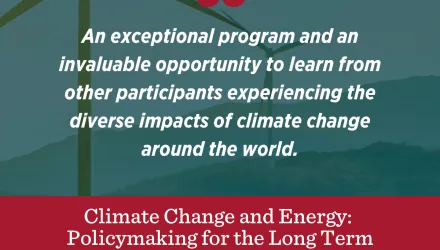About the book:
The Kyoto Protocol serves as an initial step to mitigate the threats posed by global climate change but policy-makers, scholars, businessmen, and environmentalists have begun debating the structure of the successor to the Kyoto agreement. Written by a team of leading scholars in economics, law and international relations, this book contributes to this debate by examining the merits of six alternative international architectures for climate policy.
Video of Rob Stavins discussing the book
Praise for Architectures for Agreement:
"Now that global climate change is on the international agenda, we all desperately need to construct a reasoned basis on which to build an architecture of agreement among nations. This book presents a set of penetrating essays that go a long way toward that goal." -- Sir Partha Dasgupta University of Cambridge
“The Kyoto Protocol was at best an imperfect and incomplete first step toward an effective response to the enormously difficult problem of climate change, which is characterized by huge stakes, great uncertainties, global scope, and a time-scale measured in decades or centuries. In this important volume, Joseph Aldy, Robert Stavins, and a host of distinguished contributors provide a thoughtful exploration of a range of alternative post-Kyoto top-down and bottom-up regimes and their implications. This book should be read by everyone who takes climate change seriously as a policy problem.” -- Richard Schmalensee John C Head III Dean, Emeritus MIT Sloan School of Management
“Architectures for Agreement is a genuinely interdisciplinary book that takes institutions and incentives seriously. Critically evaluating proposals for climate change policy that fail to take political realities into account, its authors put forward alternatives worthy of serious consideration and debate.” -- Robert O. Keohane, Professor of International Affairs, Princeton University.
"As diplomats and politicians around the world – from the G8 leaders to mayors of our larger cities -- struggle to find a formula for a global regime that would successfully tackle the threat of climate change, what they need most is a clear and dispassionate descriptions of the pros and cons of the competing regimes being offered up to them. And that is exactly what they will find in this volume, as it first describes and then test the three basic approaches to the problem. As Lawrence Summers points out in the Foreword, what makes global warming so hard is that it requires international cooperation at a scale to which we are not accustomed. But by thoughtfully organizing the lucidly written contributions of some 20 distinguished contributors, Joseph Aldy and Robert Stavins, the editors, give us what they promise in the title , Architectures for Agreement." -- Frank Loy Former Under Secretary of State for Global Affairs and Former Chief Climate Change Negotiator for the United States, 1998-2001
Contributing authors include:
Lawrence Summers, Joseph Aldy, Robert Stavins, Jeffrey Frankel, Daniel Bodansky, Jonathan B. Wiener, Axel Michaelowa, Richard N. Cooper, Joyeeta Gupta, David G. Victor, Carlo Carraro, Sheila M. Olmstead, Warwick J. McKibbin, Peter Wilcoxen, Richard Morgenstern, Jonathan Pershing, Scott Barrett, Daniel C. Esty, Henry D. Jacoby, William A. Pizer, James A. Hammitt, Juan-Pablo Montero, and Thomas Schelling.
“Architectures for Agreement: Addressing Global Climate Change in the Post-Kyoto World.” Edited by Aldy, Joseph and Robert N. Stavins. Cambridge University Press, September 2007







